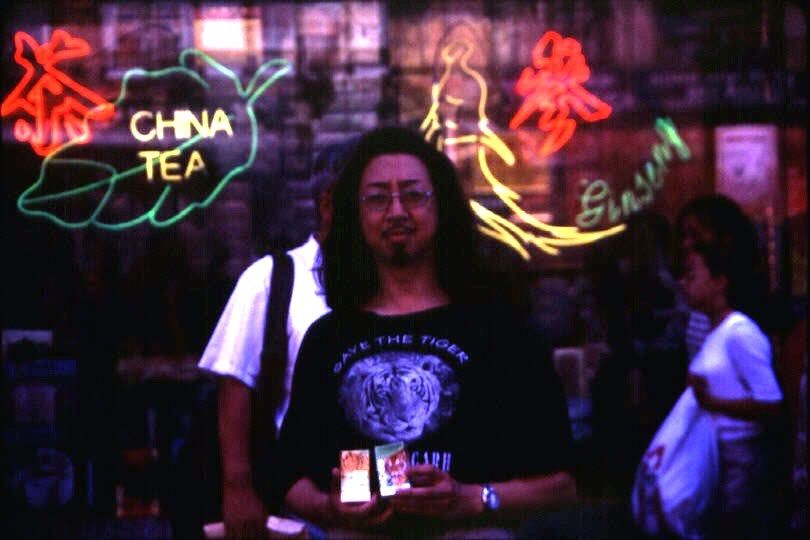Chinatown Media Campaign

Just as we have pinned the year 1880 AD as the inaugural year of the Industrial Revolution, I would pin 1995 AD, my fifty-first year on this Earth, as the inaugural year of my AR activism.
Most of my friends are Caucasian. Back in 1995, I had TV buddies of common interest, namely wildlife. Once a week or so, we got together to watch National Geographic over beer or tea (mine was tea). I loved these buddies of mine and these get-togethers, but there was often one thing that made me feel uncomfortable. Whenever an endangered species was touched upon and the Chinese use of animal parts in their traditional medicine was named as a cause of their endangerment, I would find myself on needles and pins due to my Chinese lineage, and became keenly aware that everyone else in the room was doing their best to try not glancing at me. Finally, when again it happened, I said, "Look at me. Tell me what you are thinking."
Ron, the most loud-mouthed of the bunch, cleared his throat and said, "I think it sucks. But we're honkies. We can't say a single word without being accused of racism."
Now I feel all eyes on me like lasers. I swallowed, hard, then said, "Alright, I'll do it." That was in the summer of 1995.
By November, I had checked out each and every one of the 33 traditional Chinese apothecaries for traditional Chinese medicine (TCM) containing endangered species ingredients. To my astonishment, I found highly packaged "patent medicines" galore, listing ingredients such as tiger bone, tiger penis, rhino horn, bear bile..., prominently displayed on shelves in all of the stores. I made a list of them, placing stars next to their names in terms of TV potential.
In the same period, I checked out Canadian law, and found a huge loophole that made it look like a joke. International law had it that no two nations could trade in any item containing endangered species part. And Canadian customs did check shipping containers from the Orient. But the Canadian government plainly stated that customs had enough man power to check only 2% of all the shipping containers, meaning that 98% of all illegal shipments simply slip right through, and the 2% discovered were simply confiscated, with a light monetary fine attached. The 98% that slipped through would enter Chinatown and be displayed for sale with impunity.
The reason for this is that there was no Canadian law governing the sale of these internationally illegal products once they have made their way into the country. It's like the Canadian government yelling to the smugglers, saying, "Hey, if you are smart enough to smuggle the stuff through customs, we'd allow you to sell it openly."
I thought hard as to how to cleanse Chinatown of these products, and concluded on two alternatives. One was to go into Chinatown and speak to the store owners to voluntarily destroy them, and to the Chinese people in Vancouver to not buy them. The other was to use media to blow the situation out to the public consciousness, which could press the Canadian government to create a law to ban the sale of such items anywhere within the country, such that the merchants would have no choice but to abide. The former looked to me like a pipe dream, and I settle for the latter.
By November, I was ready for action. At that point, I was just an unknown individual, and it was the subject matter that made the campaign so successful. I sent out media releases about my findings, and asked specific TV stations to come to Chinatown to document me openly purchasing endangered species products off the shelf. And no one turned me down.
In one of these operations, I would have the TV camera parked across the street, but with the camera pointed down the street as if doing a tourism shoot. They would put a mic on me and I would walk right into the store, go straight to the shelf where the endangered species products were displayed, pick out a few samples, pay for them at the counter, and walk straight back out towards the TV camera, with the products in my hands, which I would show the camera close-up. By the time I had done all three of Vancouver's main TV stations, Chinatown had gone abuzz, and the TV-coverage had gone national. Activists from Victoria BC, Toronto and Ottawa ON, wrote me and asked me to do the same with their own Chinatowns.
I spent $100 to go to Victoria by ferry, but I did not have a deep enough pocket to fly across the continent at will. In December, I took my campaign to a few local groups, asking for their support. The one that came through, big time, was the 28,000-members-strong Western Canada Wilderness Committee, headed by founder Paul George, executive director Adrian Carr, and campaign director Joe Foy, all of whom I have seen on TV before. They sat opposite me across their conference room table, and pelted me with questions. After two hours of intense interrogation, over coffee, not only did they offer to support the campaign, but hire me on as their animal-issue campaign director. The pay was low ($25,000), no lower than what Paul, Adrian and Joe were paid, and I lept to the opportunity.
To make a not-too-long story short, came March, 1966, I received a personal letter from the then attorney general Sergio Marchi pre-informing me of the imminent passing of a new law acronymed WAPPRIITA, short for "Wild Animal and Plant Protection and Regulation of International and Interprovincial Trade Act". In April, it became law. By 1997, it was fully enforced.
Anthony Marr, Founder and President
Heal Our Planet Earth (HOPE)
Global Anti-Hunting Coalition (GAHC)
Anthony-Marr@HOPE-CARE.org
www.HOPE-CARE.org
www.facebook.com/Anthony.Marr.001
www.facebook.com/Global_Anti-Hunting_Coalition
www.myspace.com/AnthonyMarr
www.youtube.com/AnthonyMarr
www.HomoSapiensSaveYourEarth.blogspot.com
www.DearHomoSapiens.blogspot.com (AM's 3rd-book-in-the-making)
www.myspace.com/Anti-Hunting_Coalition
www.ARConference.org
No comments:
Post a Comment